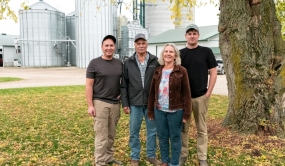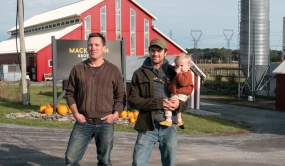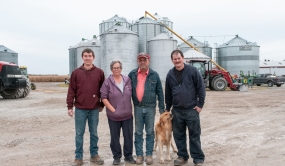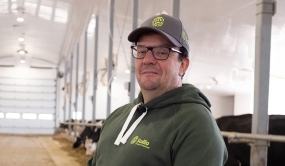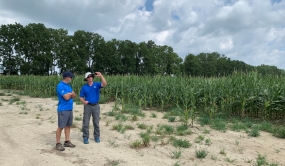
The Quebec government recently launched the Stratégie nationale d’achat d’aliments québécois {National Quebec Food Purchasing Strategy}, which is a step in the right direction to support the province’s agriculture. Sollio Groupe Coopératif welcomes this initiative as it will contribute to regional economies and strengthen the critical role played by Quebec’s farming families.
The five axis of the economic recovery plan for the agrifood sector we presented last spring, which I mentioned before, encouraged the implementation of local and direct supply circuits in Québec. Not only is the agrifood sector a source of employment, it is also a means to create wealth and its potential is enormous.
However, to make this happen we need to be there, on the ground and in good financial health. We need a strong network, one that is made up of united, resilient and sustainable cooperatives rooted in their communities and attentive to their needs. The cooperative has eyes and ears everywhere and the membership base, through various instances of the cooperative movement, informs us of its concerns and expectations. Then it is up to us to respond. We systematically explain the reasons that have brought us to make certain decisions. Such is not the case with a number of large capitalist organisations where the consumers’ opinions are seldom considered. Furthermore, these opinions are subject to the tyranny of each financial quarter.
A cooperative is an association of people who joined together to satisfy a common need. These people are directly involved in their organisation and committed to ensuring its success. They are the owners and the users; they have a vested interest in finding solutions to any problem that may arise. The economic and decisional power of the cooperative is in their hands.
This brings us to the topic of the Mountain Equipment Coop (MEC), the outdoor gear cooperative which, after 40 years in business, had to divest itself of its assets and sell to an American company. This is heartbreaking news. Believe me, I am not one to throw stones. Know that my thoughts are with the employees and members of this once great cooperative, one that has long been an object of pride as well as a glowing example of entrepreneurship in Canada. However, various circumstances and decisions, which we will not judge, have weakened its stakeholders.
This situation is reminiscent of the demutualisation wave that hit western Canada back in the 1990s and 2000s, which decimated the large grain pool cooperatives.
A PricewaterhouseCoopers (PwC) study, sponsored by Sollio Groupe Coopératif in 2018, showed that demutualisation usually occurs when four critical factors are under pressure: Poor financial performance, dysfunctional governance that lacks transparency, a decline in member motivation, weakened cooperative values and democratic engagement.
As I mentioned earlier, I am not one to throw stones. However, such situations remind us that no cooperative enterprise is protected from becoming as casualty of demutualisation. Cooperatives do not operate in a vacuum. The strength of the cooperative is its collective. It is a reflection of its members, of those it embodies.
Sollio Groupe Coopératif has taken measures to outline the demutualisation process and ensure that it does not become an easy way out, but a last resort.
Measures to prevent the risk of demutualisation allow a cooperative to remain resilient and productive: A solid financial status, strong and transparent governance, awareness of member motivations, cooperative values and a meaningful engagement. We need to use the strengths of the cooperative model to face the challenges of tomorrow.
Co-op week is being held from the 11th to the 17th of October. Let’s take full advantage of it to reflect upon our values and do everything we can to keep them alive and well.
Happy Fall Harvest!



